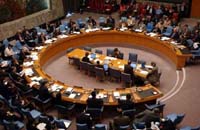U.S. seeks to befriend Iran through dimplomacy
U.S. president George Bush’s speech given before the 61-st session of the U.N. General Assembly clearly demonstrated how much Washington’s focus on external politics has recently shifted. The American president no longer threatens to bombard Iran’s nuclear sites but instead looks forward to the day on which both nations “will become good friends and partners.”

After finding itself trapped in the military campaign in Iraq the United States no longer wishes to consider war a serious alternative. Instead the U.S. administration is forced into the uneasy and controversial process of diplomacy. That means accepting the necessity of considering interests and demands of other nations and maybe even yielding things that were previously held as solid, the New York Times writes.
From the U.N. General Assembly’s tribune Bush basically admitted the ineffectiveness of his political approach through threats, intimidation and military blackmail. Only one month ago the White House said that before U.S. joins the Europeans in the talks with Iran, Teheran must wrap up its entire uranium enrichment program.
But now the Washington administration no longer insists on these conditions and quietly agrees with the initiatives of Great Britain, Germany, France and Russia to continue the peaceful talks with Iranian authorities in search of a compromise. “We don’t have anything against Iran’s peaceful program of nuclear energy development. We are working on the diplomatic solution to this crisis,” the American president highlighted.
In addition the U.S. no longer demands the international sanctions against Teheran. The U.N. Security Council resolution gave Iran time until August 31 in order to wrap up its nuclear program. In case of Iran’s refusal to cooperate according to the resolution the rebellious country would have faced international sanctions, but the Islamic Republic’s authorities made it clear even before the deadline had passed that they had intentions of complying with the demands.
By the way on Tuesday night the U.S. state secretary Condoleezza Rice invited her colleagues from the so-called “Six” – Russia, China, France, England, and Germany – to dine at the fashionable New York hotel Waldorf-Astoria. Originally the meeting intended to discuss the U.N. resolution concerning the sanctions in Iran.
But by the end of dinner Nicholas Burns, the U.S. Under Secretary of State for Political Affairs, told the reporters that all the foreign ministers participating in the discussion unanimously expressed their strong support for the initiating of talks between the European Union and the Iranian government. “We are seeking a diplomatic solution,” Burns added, “Diplomacy is the only thing we are considering at this point.”
The head of the Russian International Affairs Ministry Sergey Lavrov after the dinner meeting judged the potential solution for the Iranian nuclear problem with much optimism. “We are all expecting an agreement in order to begin moving towards the initial talks with Iran, which have been offered to that nation and appear very plausible,” he said.
Certainly Teheran closely follows the political developments and clearly understands that the U.S. is trapped and has no other alternative than to sit down for talks with Iran. The fact that the Islamic Republic’s president Mahmoud Ahmadinejad arrived in New York to attend the U.N. General Assembly is not an accident. His moral victory over Bush and the growing anti-American sentiments all over the world provided the Islamic leader with an opportunity to publicly criticize Washington’s policy in the Middle East.
Wearing his traditional shirt unbuttoned at the top Ahmadinejad took his place at the same platform where the head of the White House had been standing and pounced upon the U.S. for its attempted world domination, especially highlighting “illegitimate invasion of Iraq” and “Israel’s protectorship.” According to him “the U.S. and its ally Great Britain essentially usurped the places of prosecutor, judge and executioner in the world politics.”
Ahmadinejad accused the Western nations of abusing the U.N. mechanism in order to prevent Teheran from researching the peaceful nuclear technologies while all of them were “highly benefiting from the fruits of nuclear energy, and some have even used such technology in not so peaceful ways by building weapons.”
“Some even have the gloomy experience of applying these weapons against humanity,” the Iranian president added. In his opinion the U.N. Security Council is in no position to take away the rights of others states to work of the scientific and technological progress. “The idea of using the Council as a means of forcing threats and demands is very disturbing,” he declared, “Certain members even manage to carry out sentences before the Council draws a decision.”
Strana.ru
Translated by Natalia Vysotskaya
Pravda.ru
Subscribe to Pravda.Ru Telegram channel, Facebook, RSS!


